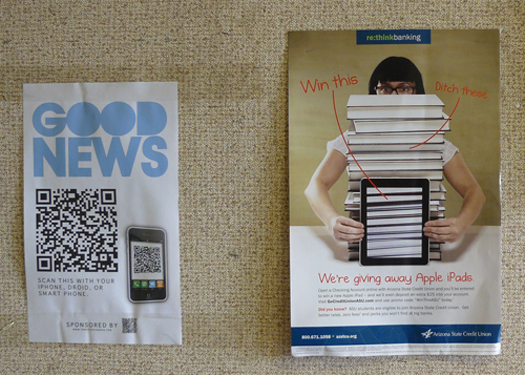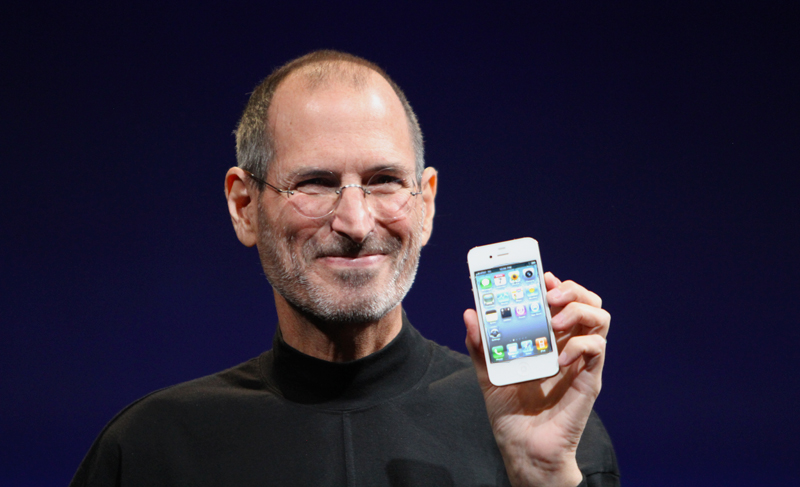Walking across a college campus these days, one is constantly reminded how important personal technology has become for today’s students. From the sorority sister texting while her beach cruiser wobbles through the crowd, to the nerds sharing a portable videogame console, the scene is reminiscent of yesterday’s science fiction. The degree of collective distraction is truly stunning. Everyone seems to be tuning into their devices as a way of tuning out the world around them.
And that makes the people whose job it is to sell things very, very nervous. Because advertising only works if people pay enough attention to it so that their passion is set aflame. That’s why we are seeing more and more attempts to mobilize the desire for distraction in the service of consumerism. The number of promotional offers in which “free iPads” are supposedly being handed out is laughably large. And invitations to scan Quick Response bar codes for more information are literally everywhere.
It’s worth asking, though, whether hailing students in this way makes as much sense as it initially seems. Students today are constantly being reminded that their future depends on technology. Whether it’s the grade-schooler whose first attempts to do math are mediated by a piece of software, the teenager who is required to give multi-media presentations using PowerPoint or the undergraduate who can only access course content over the internet, going computer-free is nearly impossible. As much as young people might be inclined to embrace personal technology on their own terms, the fact that it is now being forced on them by authority figures suggests that the appeal of the new might be less compelling than was previously the case.
There’s a lot of anxiety about the technological habits of young people. Business leaders fear that their products will be rendered prematurely obsolete. Political and religious leaders are also worried about losing touch with this market. But this anxiety appears to be leading to overcompensation eventually destined to bring about the opposite problem. When your parents and their institutional stand-ins — school, church, military — try so hard to reach you, the impulse to be wary mounts. It’s not unlike the late 1960s, when Madison Avenue started selling everything from textbooks to refrigerators in psychedelic raiment, oblivious to the fact that its allure was bound up with impracticality.
A closer look at the photograph above shows how much social pressure is being exerted on young people to be as technological as they can be. On the left is an advertisement for a local church that links “Good News” with the mobile phones capable of turning that black-and-white pattern into meaningful data. Although the church surely welcomes those who lack such devices, the implication here is that one can be “saved” by technology. Whatever happened to those paranoid rants against bar codes that declared them to be the “mark of the beast”?
On the right is an advertisement for a credit union — a kind of non-profit bank increasingly popular in the United States — which, like so many of the flyers posted around campus, uses the possibility of winning free a iPad as bait. Curiously, even though the credit union is promoting its banking services, the message being communicated has nothing to do with financial transactions per se. Rather, the viewer is forcefully told that books are antiquated and must be replaced with computer technology at the first possible opportunity. While it might not be that surprising, in the wake of the financial crisis from the fall of 2008, to see a bank promoting the abolition of books, there’s still something unnerving about the disjunction between the ad’s ostensible purpose and its subject matter.
Taken together, these advertisements seem a little too invested in technology. It’s hardly a requirement for the services they are touting. But the people who devised these campaigns seem to worry that today’s college students will only pay attention to whatever reflects their world back to them.
The odd part is that these advertisements actually seem to create the kind of consumers they wish to reach. By aggressively treating college students as experts on technology, the ads force them either to answer that call or feel marginalized vis-Ã -vis their peers. In other words, however troubled the mindset of those who implemented these campaigns, it is ultimately students who are made anxious by them. Indeed, it could plausibly be argued that advertisements like these are less for the services they are meant to tout than they are for technology itself.






thing is, *which* technology are they using and how are they paying for it? because, from a desktop pov twitter is annoying because you can’t see threads, fb is annoying because everyone is in the thread, g+ is annoying because it is threaded but is only used by gmail users, so too nichey (as yet) but back in the real world i am being texted by someone with an iphone at the rate of a manic stalker because her texts are coming up as a ‘conversation’.